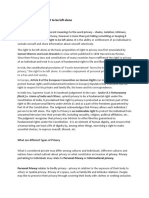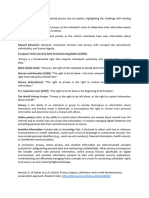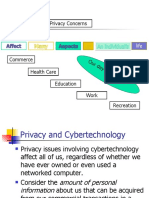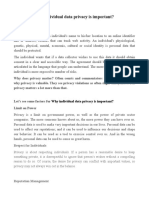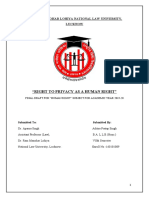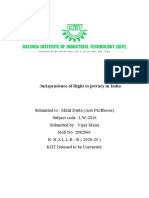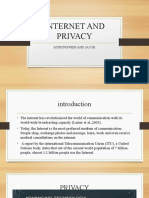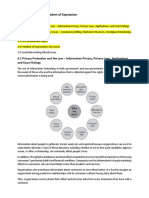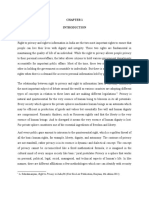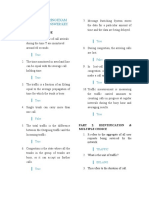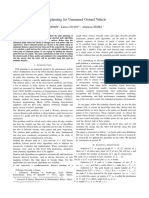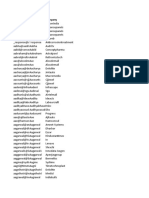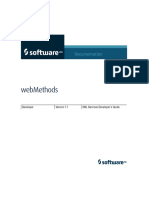MODULE SOCIAL AND PROFESSIONAL ISSUES 2 – SP2
CHAPTER 7: Privacy
Objectives:
a.) Differentiate the privacy and its concept.
b.) Discuss the different type of privacy aspects.
c.) Identify the privacy protection law in other countries and in the
Philippines.
Lesson 1: Introduction
Privacy is the ability of an individual or group to seclude themselves or information
about themselves, and thereby express themselves selectively.
When something is private to
a person, it usually means that
something is inherently special or
sensitive to them. The domain of privacy
partially overlaps with security, which
can include the concepts of appropriate
use, as well as protection of information.
Privacy may also take the form of bodily
integrity. The right not to be subjected to
unsanctioned invasions of privacy by
the government, corporations or individuals is part of many countries' privacy laws, and in some
cases, constitutions.
In the business world, a person may volunteer personal details, including
for advertising, in order to receive some sort of benefit. Public figures may be subject to rules on
the public interest. Personal information which is voluntarily shared but subsequently stolen or
misused can lead to identity theft.
The concept of universal individual privacy is a modern concept primarily associated
with Western culture, British and North American in particular, and remained virtually unknown
in some cultures until recent times. Most cultures, however, recognize the ability of individuals
to withhold certain parts of their personal information from wider society, such as closing the
door to one's home.
Page 1
� MODULE SOCIAL AND PROFESSIONAL ISSUES 2 – SP2
Lesson 2: Privacy aspects
Privacy aspects
1. Right to be let alone
In 1890 the United States jurists Samuel D. Warren and Louis Brandeis wrote "The Right to
Privacy", an article in which they argued for the "right to be let alone", using that phrase as a
definition of privacy. There is extensive commentary over the meaning of being "let alone", and
among other ways, it has been interpreted to mean the right of a person to
choose seclusion from the attention of others if they wish to do so, and the right to be immune
from scrutiny or being observed in private settings, such as one's own home.
2. Limited access
Limited access refers to a person's ability to participate in society without having other individuals
and organizations collect information about them.
3. Control over information
Control over one's personal information is the concept that "privacy is the claim of individuals,
groups, or institutions to determine for themselves when, how, and to what extent information
about them is communicated to others."
4. States of privacy
Alan Westin defined four states—or experiences—of privacy: solitude, intimacy, anonymity, and
reserve. Solitude is a physical separation from others. Intimacy is a "close, relaxed, and frank
relationship between two or more individuals" that results from the seclusion of a pair or small
group of individuals. Anonymity is the "desire of individuals for times of 'public privacy.'" Lastly,
reserve is the "creation of a psychological barrier against unwanted intrusion"; this creation of a
psychological barrier requires others to respect an individual's need or desire to restrict
communication of information concerning himself or herself
5. Secrecy
Privacy is sometimes defined as an option to have secrecy. Richard Posner said that privacy is the
right of people to "conceal information about themselves that others might use to their
disadvantage".
6. Personhood and autonomy
Privacy may be understood as a necessary precondition for the development and preservation of
personhood. Jeffrey Reiman defined privacy in terms of a recognition of one's ownership of his
or her physical and mental reality and a moral right to his or her self-determination. Through the
"social ritual" of privacy, or the social practice of respecting an individual's privacy barriers, the
social group communicates to the developing child that he or she has exclusive moral rights to
Page 2
� MODULE SOCIAL AND PROFESSIONAL ISSUES 2 – SP2
his or her body—in other words, he or she has moral ownership of his or her body. This entails
control over both active (physical) and cognitive appropriation, the former being control over
one's movements and actions and the latter being control over who can experience one's physical
existence and when.
Alternatively, Stanley Benn defined privacy in terms of a recognition of oneself as a subject with
agency—as an individual with the capacity to choose. Privacy is required to exercise choice.[
Overt observation makes the individual aware of himself or herself as an object with a
"determinate character" and "limited probabilities." Covert observation, on the other hand,
changes the conditions in which the individual is exercising choice without his or her knowledge
and consent
7. Self-identity and personal growth
Privacy may be understood as a prerequisite for the development of a sense of self-identity.
Privacy barriers, in particular, are instrumental in this process. According to Irwin Altman, such
barriers "define and limit the boundaries of the self" and thus "serve to help define [the
self]." This control primarily entails the ability to regulate contact with others. Control over the
"permeability" of the self's boundaries enables one to control what constitutes the self and thus
to define what is the self.
8. Intimacy
In a way analogous to how the personhood theory imagines privacy as some essential part of
being an individual, the intimacy theory imagines privacy to be an essential part of the way that
humans have strengthened or intimate relationships with other humans. Because part of human
relationships includes individuals volunteering to self-disclose most if not all personal
information, this is one area in which privacy does not apply
9. Personal privacy
Physical privacy could be defined as preventing "intrusions into one's physical space or
solitude." An example of the legal basis for the right to physical privacy is the U.S. Fourth
Amendment, which guarantees "the right of the people to be secure in their persons, houses,
papers, and effects, against unreasonable searches and seizures".
Physical privacy may be a matter of cultural sensitivity, personal dignity, and/or shyness. There
may also be concerns about safety, if for example one is wary of becoming the victim of crime
or stalking.
10. Organizational
Government agencies, corporations, groups/societies and other organizations may desire to
keep their activities or secrets from being revealed to other organizations or individuals, adopting
various security practices and controls in order to keep private information confidential.
Page 3
� MODULE SOCIAL AND PROFESSIONAL ISSUES 2 – SP2
Organizations may seek legal protection for their secrets. For example, a government
administration may be able to invoke executive privilege or declare certain information to
be classified, or a corporation might attempt to protect valuable proprietary information as trade
secrets
Privacy on the Internet
There are many means to protect one's privacy on the internet. For example, e-mails can be
encrypted (via S/MIME or PGP) and anonymizing proxies or anonymizing networks
like I2P and Tor can be used to prevent the internet service providers from knowing which sites
one visits and with whom one communicates. Covert collection of personally identifiable
information has been identified as a primary concern by the U.S. Federal Trade
Commission.[74] Although some privacy advocates recommend the deletion of original and third-
party HTTP cookies, Anthony Miyazaki, marketing professor at Florida International
University and privacy scholar, warns that the "elimination of third-party cookie use by Web sites
can be circumvented by cooperative strategies with third parties in which information is
transferred after the Web site's use of original domain cookies."[75] As of December 2010, the
Federal Trade Commission is reviewing policy regarding this issue as it relates to behavioral
advertising.[74] Another aspect of privacy on the Internet relates to online social networking.
Several online social network sites (OSNs) are among the top 10 most visited websites globally.
A review and evaluation of scholarly work regarding the current state of the value of individuals'
privacy of online social networking show the following results: "first, adults seem to be more
concerned about potential privacy threats than younger users; second, policy makers should be
alarmed by a large part of users who underestimate risks of their information privacy on OSNs;
third, in the case of using OSNs and its services, traditional one-dimensional privacy approaches
fall short".[76] This is exacerbated by the research indicating that personal traits such as sexual
orientation, race, religious and political views, personality, or intelligence can be inferred based
on the wide variety of digital footprint, such as samples of text, browsing logs, or Facebook Likes
For more knowledge about privacy, please check the link provided;
https://www.youtube.com/watch?v=ZNEPaGFApX4
Page 4
� MODULE SOCIAL AND PROFESSIONAL ISSUES 2 – SP2
Lesson 3: Protection
Most countries give citizen rights to privacy in their constitutions Representative
examples of this include the Constitution of Brazil, which says "the privacy, private life, honor and
image of people are inviolable"; the Constitution of South Africa says that "everyone has a right
to privacy"; and the Constitution of the
Republic of Korea says "the privacy of no
citizen shall be infringed. Among most
countries whose constitutions do not
explicitly describe privacy rights, court
decisions have interpreted their constitutions
to intend to give privacy rights.
Many countries have broad privacy laws
outside their constitutions, including Australia's Privacy Act 1988, Argentina's Law for the
Protection of Personal Data of 2000, Canada's 2000 Personal Information Protection and
Electronic Documents Act, and Japan's 2003 Personal Information Protection Law.
Beyond national privacy laws, there are international privacy agreements. The United
Nations Universal Declaration of Human Rights says "No one shall be subjected to arbitrary
interference with his privacy, family, home or correspondence, nor to attacks upon his honor and
reputation. The Organisation for Economic Co-operation and Development published its Privacy
Guidelines in 1980. The European Union's 1995 Data Protection Directive guides privacy
protection in Europe. The 2004 Privacy Framework by the Asia-Pacific Economic Cooperation is a
privacy protection agreement for the members of that organization.
In the 1960s people began to consider how changes in technology were bringing changes in the
concept of privacy. Vance Packard’s The Naked Society was a popular book on privacy from that
era and led discourse on privacy at that time
Data Privacy in the Philippines
Republic Act No. 10173, otherwise known as the Data Privacy Act is a law that seeks to
protect all forms of information, be it private, personal, or sensitive. It is meant to cover both
natural and juridical persons involved in the processing of personal information.
As mentioned earlier, the Data Privacy Act applies to any natural or juridical persons
involved in the processing of personal information. It also covers those who, although not found
or established in the Philippines, use equipment located in the Philippines, or those who maintain
an office, branch, or agency in the Philippines.
Under Sec. 3(j) of the Data Privacy Act, “[p]rocessing refers to any operation or any set of
operations performed upon personal information including, but not limited to, the collection,
Page 5
� MODULE SOCIAL AND PROFESSIONAL ISSUES 2 – SP2
recording, organization, storage, updating or modification, retrieval, consultation, use,
consolidation, blocking, erasure or destruction of data.”
In other words, processing of personal information is any operation where personal
information is involved. Whenever your information is, among other things, collected, modified,
or used for some purpose, processing already takes place.
Under Sec. 3(k) of the Data Privacy Act, “[p]rivileged information refers to any and all
forms of data which under the Rules of Court and other pertinent laws constitute privileged
communication.” One such example would be any information given by a client to his lawyer.
Such information would fall under attorney-client privilege and would, therefore, be considered
privileged information.
Under the Implementing Rules and Regulations of the Data Privacy Act, all organizations
are required to appoint a Data Protection Officer (“DPO”). The Data Protection Officer shall be
accountable for ensuring compliance with the appropriate data protection laws and regulations.
For more knowledge about data privacy in Philippines, please check the link
provided; https://www.youtube.com/watch?v=pzDyLvOZZN0
REFERENCES
https://en.wikipedia.org/wiki/Privacy#:~:text=Privacy%20is%20the%20ability%20of,special%20o
r%20sensitive%20to%20them.
https://privacy.com.ph/learn-data-privacy-compliance/data-privacy-faqs/
Page 6




